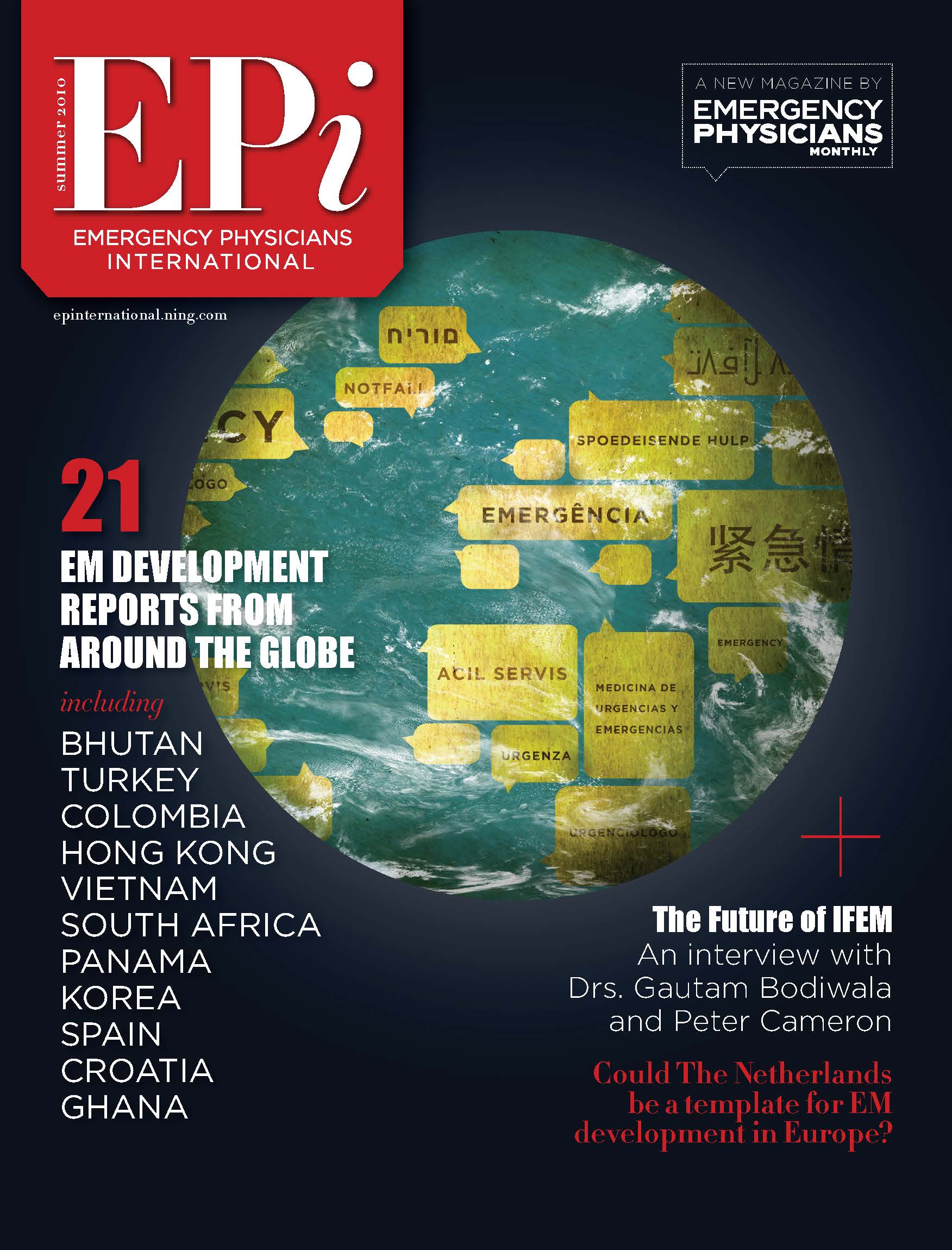Spotlight on Child Life Specialists
(Photo courtesy of Healthy Humor)
Emergency medicine relies on multifaceted approaches that would not be possible without the incredible talents of each team member. In the following Q&A, Brynna Scherloum, Child Life Specialist and hero to many, explores the work she does to support pediatric emergency care.
Introduction: tell me about yourself and your work!
I started at Children's National Hospital about nine years ago, leading the pre-surgical tour program for patients before a scheduled procedure, to orient them and their families to the space, the surgical center, and the hospital. Under the guidance of staff at Children’s National I learned about the field of Child Life and the impact the role has on the experience patients have with the medical world. In 2015, I went back to school and received a Bachelor's in Family Studies and a Masters in Child Life: Hospital Administration and Family Collaboration from Towson University. I have worked at Children's National Hospital in the Emergency Department for just over a year. I have been a certified Child Life Specialist here at Children's National for about three and a half years. I worked on a short stay overflow inpatient unit before moving to the emergency department, but the emergency department is always where I have wanted to be. I enjoy the challenges of new patients and situations every day. You don't know what to expect and I really enjoy the procedural aspects of my work: helping get the patient through each procedure, test and experience they have in the emergency department. Every experience I have had informs the work I do, similar to how every experience I help facilitate for a child informs and supports their next experience.
What does a Child Life Professional do? What is your role in emergency medicine?
I establish a positive experience for patients and siblings in the hospital, regardless of what their medical conditions are, by providing procedural support, diagnosis education, coping tools, and normalization with the hospital experience. I prepare children for procedures, using medical equipment, developmentally appropriate language, and relevant images of where they are going. This provides understanding of the steps involved in a procedure and facilitates exploration of the potential sensory experiences. It also emphasizes what choices the patient has during this procedure, and offers an understanding of why we are doing this, medically. This work supports a proactive, involved education and cooperation relationship with the patient so they feel like we are doing things with them, not just to them.
In the emergency department setting, it is important to gain an understanding of the patients prior healthcare experiences. As a visit to the emergency department is not typically planned, my role is about building off of what they already know, clarifying any misconceptions, and preparing them for what is to come. This can include everything, from an IV to imaging, from new diagnoses to discharge. For example, when getting an IV, I show them what the materials are like and give the patients the chance to touch the catheter, the tournacate and the different things the medical team uses. I do this to help them understand what those things are for. We often practice on a doll, giving the patient some control over the situation and modeling their role as well as the role of the medical staff. The patient and I develop a coping plan for the procedure such as holding their mom’s hand, or watching a video, while maintaining the patient's important job of helping to stay still. I also just help to make this experience more positive and less scary. There are a lot of unknowns in the emergency department. Reminding kids that they can color and laugh and play is beneficial to their overall wellbeing. Helping to establish some familiarity and common ground, whether it's playing with play dough or watching something fun on TV, helps to get the patient's mind off some of the unknowns. It gives them something familiar that they can grasp onto to ground them in this moment and this experience while they're in the hospital.
How does your work intersect with physicians, nurses, etc.? What is your role on a healthcare team?
Working with a medical team, we always establish what's happening next, so I know what I need to prepare each patient for, by understanding the bigger picture of what the team is thinking medically. My role as part of the multidisciplinary team is to relay or interpret concerns, fears, or questions the patient has to the healthcare teams. I also facilitate developmentally appropriate explanations to the patient of what the team is doing in their care plan to help patients feel better. In a procedure, I can focus on the patient as a person, not an illness or injury; I get their attention to redirect their focus, distract them, and support coping techniques. This enables physicians and nurses to focus on their role, particularly for tasks such as getting an IV or doing a test. By calming the patient and helping them hold still, other team members can do their job without the distraction of a distressed or escalated child.
How does your work look different with different kinds of patients?
The foundation of my work is in child development and how hospitalization, illness, and injury can affect continued positive psychosocial growth. My role looks very similar regardless of the reason the patient is there, but my interventions look different depending on the development of the patient and what their coping needs are for that moment and how we can get them through to the next step. Regardless of diagnosis or reason for admission, my role includes establishing what the patient already knows, what they think is going to happen, and how I can fill in the missing pieces of their understanding. This ensures they have a correct, positive experience and understanding going forward to get through each procedure, test, or treatment plan through their admission.
What does your work look like in the pandemic? What is hardest about the way your work has changed? What are some changes you think have enhanced your ability to provide care?
I would say now, during the pandemic, we are seeing a lot more patients in our psych area-- adolescents and school age children, having emotional challenges. So, my team is doing a lot more with that population. We are supporting their understanding of the next steps and why they are here, and creating resources for them to be able to cope through their experience while they are in the emergency department for extended periods of time prior to inpatient admission. Additionally, we are providing more resources that the medical team can use when I am not available. This is to minimize the number of times that people are going into an isolation room for a patient who is COVID positive (and minimize general exposure). It is important to make it possible for staff to use available resources to support normalization for the patient. That is also one of the hardest things about the way our work has changed: assessing coping needs and establishing a therapeutic relationship with the patients. Ideally, I would be spending a lot more time with each patient. We are unable to do this because of restrictions that reflect the need to minimize the number of minutes we are with the exposed patients. What has enhanced my ability to provide care, is that our team has really come together to rethink those methods and resources we all use to support the patients. Even though there are constantly changing restrictions concerning who goes in a room, how often you go into a room, and sometimes if parents can even be in the room with the child, we are all working to develop resources we can provide for families and children while they're here. This also happens when working with my counterparts in the inpatient units, passing off information to ensure continuity of care with other child life specialists. We include information about the patient and family's experience so far: these are challenges that the child is facing, what coping things we are able to work on, what things could be challenges in the future, and what would be helpful for them during their stay.
What is something about your job that never fails to excite you?
Something that never fails to excite me about my work is really seeing the difference I make for kids. When I walk into a room, they don't know who I am; I could be a nurse with a needle or a doctor with bad news. Then, we talk through what my role is, and what's actually happening, and you can see the physical change in their bodies as the patients and parents just relax. We start joking and they just start laughing and we talk about what's going to happen and how I can help make it a more positive experience. Patients often have an expression of, "Oh! That wasn't so bad!" I think that really excites me: seeing how my work can really make a difference and change the perspective and fears that these children often have coming into an unfamiliar situation. It excites me to empower patients and families with tools so that they feel better able to cope with this experience, along with the hope that next time they come to the hospital or go to a doctor's office, they are able to build upon those tools we worked on. I hope that maybe the next time they have to get an IV, they won't be so scared because they remember what it is like and why they are getting it, because they know what to expect and remember they have the coping tools to make it easier. My hope is that for each next experience, children are able to build on a positive understanding and relationship with the medical world. What always excites me is seeing the bigger picture in a child’s future through this one medical experience. As a certified Child Life Specialist in the Emergency Department, it is my end point when I help get that patient through this experience. I know that it's not really the end result because then that's building on the next experience that child will have.







